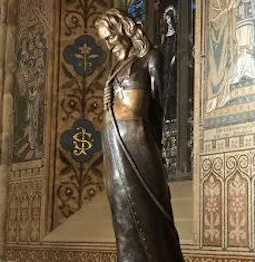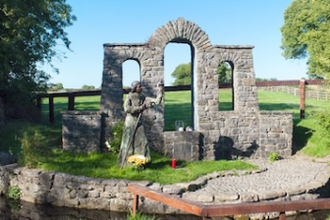Armagh: Archbishop Martin preaches on St Oliver Plunkett

Statue of St Oliver Plunkett in St Patrick's Cathedral, Armagh, unveiled by Archbishop Martin in 2019
Archbishop Eamon Martin, Archbishop of Armagh and Primate of All Ireland gave this homily following the annual procession of the holy relics of Saint Oliver Plunkett to Saint Peter's Church, Drogheda, Co Louth, in the Archdiocese of Armagh.
In this Jubilee Year of Hope, we have been very fortunate here in Ireland to be able to celebrate special moments, like the 800th anniversary of the canonisation of Saint Laurence O'Toole; the centenary of Venerable Matt Talbot's death; 80 years since the outstanding witness of our Columban missionaries who were martyred in the Philippines - 'like lambs among wolves' - and also the 75th anniversary of the Columban martyrs who gave their lives in Korea.
In the Archdiocese of Armagh - and especially so here in Drogheda - the pinnacle of our Jubilee Year celebrations is the double anniversary of Saint Oliver Plunkett: born 400 years ago in 1625, and canonised 50 years ago in 1975.
During his first four years as Archbishop, Oliver threw himself energetically into mission mode. Bishop Desmond Forristal described him as "a man in a hurry", who wasted no time in administering the sacraments; establishing a school here in Drogheda to educate the youth and instruct clerics. Archbishop Oliver also conducted many pastoral visitations and convened synods and councils to reform the Church. When necessary, he stepped in as a mediator and peacemaker to help heal various disputes and divisions. He built relationships with the Protestant Archbishop and clergy, and he was particularly zealous to ordain, instruct and form the clergy, driven, no doubt, by those Gospel words: "the harvest is rich, but the labourers are few".
But within four years, by the end of 1673, the political tide was turning against the Catholic Church. Archbishop Oliver Plunkett, showed immense courage. Taking little account of his own needs and health, he tirelessly and unapologetically proclaimed the Gospel, despite increasing opposition and even direct threats to his life. By 1678 he was a fugitive. He wrote, "I am certain I will be captured as there are so many hunting for me. But whatever the danger, I will stay with my flock and will not abandon them until I am dragged to the ship".
Eventually he was arrested and imprisoned on account of a malicious charge that he was involved in the so-called 'Popish plot'. After prolonged imprisonment in Dublin and in London, he was put through a sham trial and unjustly condemned to death. In the end, Oliver suffered the ultimate humiliation - he was dragged through the crowded streets of London before being publicly hung, drawn and quartered at Tyburn Cross. But he never lost hope in a heavenly homeland, and even from the gallows, Archbishop Oliver proclaimed his faith in the Risen Lord, and forgave those who had plotted against him.
We might ask ourselves, why did he do it? Why did Saint Oliver show such determination and courage in the face of blatant bigotry and public demeaning of his character? Why was he so serene while being dragged to such a brutal end? It was because he lived, and died, by the principle of "no greater love", literally laying down his life for love of God and for his people, and for his undying conviction that Hope in Christ does not disappoint.
Let me ask it another way: Why did his persecutors seek to destroy Saint Oliver Plunkett? Could they not accept that this faithful shepherd would never leave his beleaguered flock? The answer is: because Evil abhors Faith; Evil hates Love, and Evil especially detests Hope because, as Pope Francis once put it, "Hope keeps alive the deep conviction that good is stronger than evil, and that God, in Christ, has conquered sin and death."
That is why on Easter Sunday morning, just hours before he died, Pope Francis added, "Evil has not disappeared from history; it will remain until the end, but it no longer has the upper hand …Christ is Risen. Love has triumphed over hatred, light over darkness and truth over falsehood. Forgiveness has triumphed over revenge".
Pope Benedict XVI once asked: "On what is martyrdom founded?" "The answer", he said, "is simple: it is founded on the death of Jesus, on his supreme sacrifice of love in the cross; and it gets its strength from a deep and intimate union with Christ, because martyrdom and the vocation to martyrdom are not the result of human effort but the response to the call of God; they are a gift of God's grace that enables a person, out of love, to give his (or her) life for Christ and for the Church, and hence for the world."
Saint Oliver Plunkett was completely aware of his call to martyrdom. No doubt he would have prayed those words of Saint Paul to the Galatians, "The only thing I can boast about is the cross of our Lord Jesus Christ, through whom the world is crucified to me, and I to the world". He had no hesitation, therefore, in taking up his cross every day and freely following Christ along the path of unconditional love.
And this brings to mind another of our Jubilee year anniversaries, namely, the 350th anniversary of the Sacred Heart revelations to Saint Margaret Mary Alacoque. She described the Lord opening his heart to her, saying: "This is the heart that so loved human beings that it has spared nothing, even to emptying and consuming itself in order to show them its love". Saint Margaret Mary's spiritual director - a Jesuit priest named Claude de La Colombière - defended her publicly. He helped to spread the word about her visions and to explain their meaning in the light of the Gospel.
It struck me recently that Sister Margaret Mary's visions of the Sacred Heart at Paray-le-Monial, from 1673-1675, were happening at precisely the same time that Archbishop Oliver was spreading the Good News of Christ's love amongst his people in Ireland. Whether or not Archbishop Oliver ever heard of these visions of the Sacred Heart, it is clear that he too was inspired by the human and divine love of the heart of Jesus Christ, both in his life and in accepting his death; one might even say Archbishop Oliver was an anticipatory apostle of the Sacred heart.
His solitary confinement for many months under stark conditions became his personal Gethsemane. But, like Christ, he was serene and prayerful in his suffering, surrendering himself in complete submission to God's will. He cheerfully chose even more penance, by often refusing the meagre daily rations of prison food.
Archbishop Oliver meditated on the Passion of Christ with all its wounds and thorns, and he clearly wanted to unite his own imminent death at Tyburn Cross with that of our suffering Saviour on the cross at Calvary - although Oliver remarked that his suffering would be merely a "fleabite" in comparison! Nonetheless, he asked forgiveness for his own sins, and joyfully offered up his sacrifices for an end to the persecution of his flock in Ireland and so that, by his death, the number of Catholics would once more increase.
Meanwhile, the Jesuit priest Fr Claude de La Colombière, who had been transferred to England, wrote in his diary of how shocked he was to discover that a bounty had been set on the head of the Archbishop of Armagh. Father Claude was himself arrested and imprisoned in England on account of the Popish plot. He escaped execution because he was a French citizen and, returning to France as an exhausted and broken man, he died in 1682, just a year after Saint Oliver. He was canonised in 1992.
In this context, I think it is fitting to note that Saint Margaret Mary Alacoque, the visionary of the Sacred Heart, was canonised by Pope Benedict XV, on 13 May 1920, just ten days before he beatified our own Saint Oliver Plunkett.
Dear brothers and sisters, during this Jubilee Year the lives of so many saints and martyrs are encouraging us to be like them: pilgrims of hope in this troubled world. Their message for us in clear: do not be afraid to answer God's call to holiness, to take up your own daily crosses, to deepen your love for Christ and do all you can to build "a civilisation of love". In that way, peace and mercy can flow like a river, and the whole earth can cry out with joy, singing to the name of the Lord!
Through the intercession of Saint Oliver Plunkett, Saint Laurence O'Toole, Saint Columbanus and the Columban martyrs, Venerable Matt Talbot, and all the holy women and men of Ireland, may our hearts be on fire this Jubilee, so that we radiate, like them, the message of Love and Hope in Christ, Amen.


















